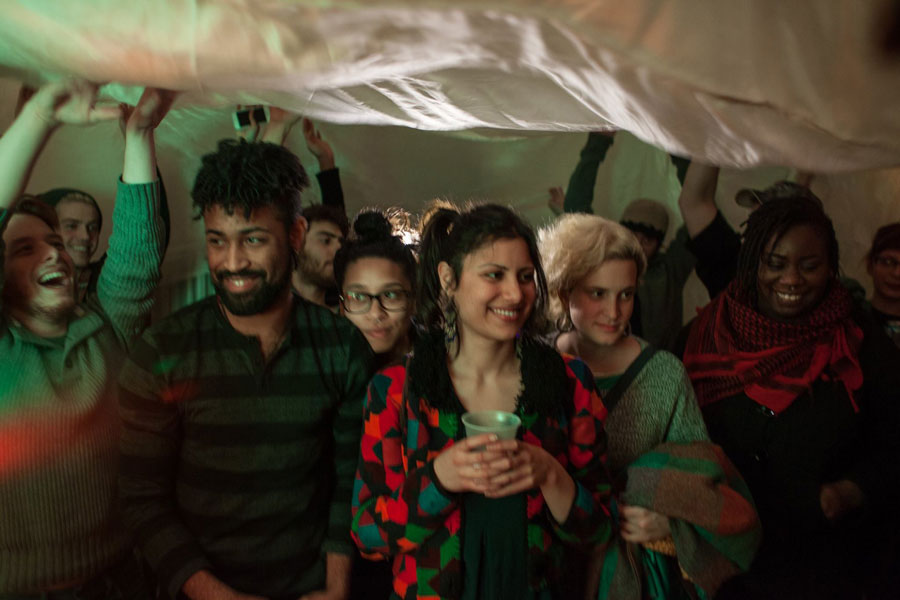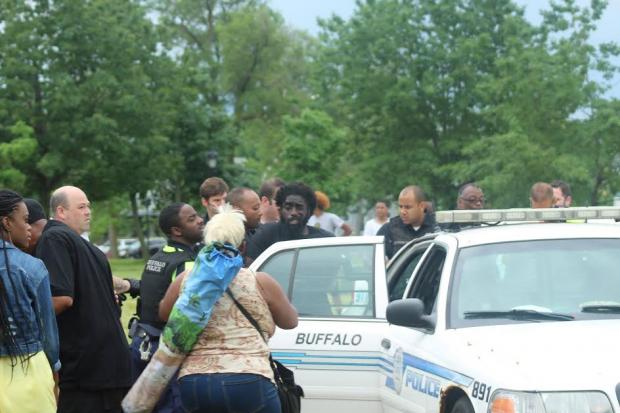Police at Juneteenth, Inspectors at Dreamland
Two unpleasant incidents in the past week connected by a theme, says a local lawyer: “the over-policing of black bodies”
On Monday’s 152nd anniversary of the abolition of slavery in Texas, celebrated widely as Juneteenth, a handful of demonstrators returned to the site of one of the nation’s largest such festivals in Martin Luther King, Jr. Park to call attention to what they characterized as over-policing of the weekend’s festival.
According to several witnesses, there were over 100 police in addition to private security firms and yellow-shirted Peacemakers, an anti-violence coalition aligned with the police, in attendance at the festival. The parade that began the festival was led by the Erie County Sheriff’s mounted patrol followed by a Buffalo Police MRAP and other military-grade vehicles. “You couldn’t turn around without bumping into an officer,” said demonstrator James Lopez.
A man was pepper-sprayed and detained by police without cause, according to Alexander J. Wright, who witnessed the event directly and uploaded his account to Facebook in the immediate aftermath on Father’s Day. He was working a tent for the African Heritage Food Coop he helps organize and run, when he saw a man with a backpack standing with his family, including his own children near the “Edutainment” stage.
When security approached him and asked him to open his backpack, he put his hands in the air, asked “Why?” and was immediately pepper-sprayed and physically restrained while police removed and searched his backpack. The incident took place in front of dozens of witnesses including many children, who shared similar versions of the event on social media. The man, identified as Matthew Boaz Singletary, told The Public “I don’t really know what happened.” “One minute I was taking pictures of my loved ones,” he wrote in a text, ”and enjoying a great show and then before I could blink my eye it [was] sprayed and I was being slammed on the ground and beat on.” Singletary claims he has chemical conjunctivitis in his right eye, a muscle strain, a chemical burn on his face, and a laceration on his wrist from being cuffed. Singletary says he was not charged with any crime and released.
Organizers from Just Resisting were troubled not just by the heightened presence and aggressive conduct they perceived from the Buffalo Police Department, but by the use of the park’s casino as a temporary security base during the weekend festival. Natasha Soto and Phylicia Brown recounted how they witnessed a young black youth detained after a scuffle and brought into the casino instead of into a police car.
During a reporter’s visit on Monday, the casino door still bore a sign “No public admission, security only.” A worker inside the casino who was busy on the renovations confirmed that that sign had been placed on the door over the weekend.
The use of the casino as a “detention facility” irked Brown, who grew up in the surrounding area. “We used to come here and play in that building, so seeing that building used to detain an individual was very traumatic,” she told reporters.
Lopez, Soto, and Brown all stated they witnessed other unnecessarily aggressive contact between officers and people at the festival. Another unnamed bystander who attended the parade said there was as many police at Juneteenth as there usually are at the St. Patrick’s Day parade, which is attended by many more people. She also said she witnessed police checking people’s cups for alcohol, something she said she had never seen at the Delaware Avenue parade. Brown pointed out to reporters that at other large-scale festivals in Buffalo, you don’t see people “surrounded by police officers asking them to put their shirts on, asking them what’s in their backpacks, asking them to stop gathering with their friends.”
The Buffalo News reported a single arrest during the event: A “’known gang member’” (the News put this in quotes) was seen by police and after “being stopped for questioning,” he “allegedly tried to run away.” He was found with a loaded gun in his pocket.
Just Resisting posted a flier all around the casino property in the fashion of an official notice to “cease all operations.” “You are to cease all operations immediately,” it read. “Due to the mistreatment, abuse, and violence towards Black and Brown residents of Buffalo, we demand the termination of this building’s use as a detention facility. We demand this building be released for the purpose of Black joy. Failure to abide by this order will result in community resistance.”
The casino is in the final stages of a $2.6 million renovation.
***
About a week ago, the venerable arts space in Allentown known as Dreamland was served a similar “cease all operations” notice, except theirs was legally binding and signed by a Buffalo housing inspector, shuttering them for lack of city licenses for music, dance, and public assembly.
Heading into its fourth year, Dreamland has become the rare art space in Buffalo that realizes the inherent strengths of diversity in community and culture-making, a place where the city’s racial and economic segregation shrivels. In 2014, The Public’s Cory Perla called it a “haven for the avant-garde in Buffalo, and the collective that runs the place has successfully balanced the line between remaining all-inclusive and maintaining a safe environment.”
“There’s really no space in Buffalo run by a diverse mix of queer, people of color, and differently abled people other than us,” Dreamland director Dana McKnight told us.
To tax lawyer Heidi Jones, who was instrumental in helping Dreamland launch in 2014 and is assisting them currently in getting their doors back open, the connection between Dreamland and Juneteenth is clear: “the over-policing of black bodies.”
According to McKnight, someone may have targeted the space and she isn’t sure why. The public assembly license, for example, shouldn’t apply to Dreamland in her estimation because the space is under the square footage allowance for that license. McKnight says she’s had friction with the Allentown Village Society in years past, and McKnight insinuated to the Buffalo News that it was likely that group, responsible for the staging of the annual Allentown Arts Festival, that complained to the city.
In the midst of a social media backlash against AVS last week, we contacted its president, Rita Lippman, who tried to put the allegation to bed. Lippman denied any prior conflict with McKnight or Dreamland and said, “The last thing we would ever do is shut down an arts group. I’m very hurt by this.”
Meantime, friends of the collective have raised over $4,000 for legal and other expenses associated with getting the space back up and running. Jones, McKnight, and others are set to meet with the city’s office of licenses and permits around the time this paper goes to print on Tuesday.
“The response to Dreamland getting shut down has been absolutely breathtaking,” McKnight told The Public. “It’s like: ‘Oh, people do appreciate this.’ We did carve a space for people to actively be themselves outside of the trappings of subculture. All of our work is rooted in really tender justice, and now we see it worked.”

Dreamland. Photo by Pierce McCleary.

